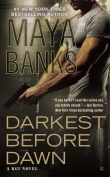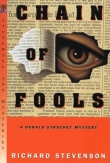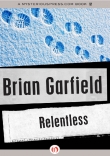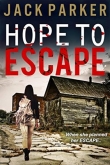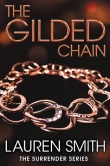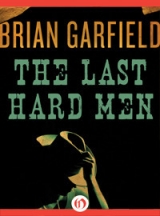
Текст книги "The Last Hard Men"
Автор книги: Brian Garfield
сообщить о нарушении
Текущая страница: 10 (всего у книги 12 страниц)
It seemed foolproof enough. It was the only kind of thing you could do when you were one against three: divide them, pick them off one at a time.
But he was scared.
His nerves kept playing tricks on him. The two .30-06 shots he’d fired at Taco Riva had left his ears blocked, there was still a ringing in his skull, and he wasn’t confident he would hear them before they were very close. He wasn’t sure he was agile enough to jump a man from a brush-ambush like this and get to the man before the man heard him coming. He wasn’t sure of a lot of things. He hid and waited and trembled with fear.
* * *
They were a little careless, and he heard their twig-snapping approach. Three of them. They were coming up through the forest, walking together. Then, about seventy-five feet downslope from him, they stopped and discussed things. He couldn’t hear their words. In the shadowy moonlight under the trees he couldn’t be sure of all of them, but two of them were very big men, one of them had a lot of meat on him, and that one had to be Will Gant. The other big one was probably Joaquim Quesada. The third man, leaner, might be Menendez or it might be Shiraz or it could even be the kid, Shelby; impossible to tell.
He saw now why they had paused. They were standing at just about the point where Burgade’s tracks came down off the hillside and turned to follow the prints of the horses.
One of them—Gant—made arm gestures, and the smallest of the three turned off into the woods and went downhill, west, disappearing into the trees. Burgade couldn’t see whether that one carried a rifle or not. Anyhow the man seemed to be working in a half circle, probably intending to come up on the horses from one side.
Now Gant began to walk forward, leaving Quesada back there to cover him. Gant came right along on top of Burgade’s prints, moving swiftly from tree to tree, taking his time to keen the night at each pause. They could as easily have turned around and gone away, but that wasn’t the way their minds would work. They would figure they had him outnumbered, he was the only immediate threat, and once they had him out of the way they could safely rejoin Provo and get back to Provo’s gold. So they had a stake in putting Burgade away, and they hadn’t turned back. He’d counted on that.
Gant came by almost near enough to reach out and touch. Burgade kept still. Gant wasn’t likely to see him, and Quesada was back there, moving slowly forward, covering Gant. Quesada had a rifle. Burgade let Gant go by. He didn’t start breathing again until Gant was ten feet away. The stink of Gant’s body lingered in the air, giving away the man’s tense emotions in gamy odors.
Burgade felt clammy. The moon was half over west, throwing its pale light down at an angle through the trees. Gant’s boots went crunching up the gentle grade toward the bed beyond which the horses were browsing. Quesada came along more slowly, turning his head both ways and poking the air ahead of him with his rifle. Burgade watched him come. Quesada had lost his hat in the confusion; faint light glimmered on the bald peak of his big head, surrounded by its bushy monk’s fringe. The big-nosed face swiveled like a pivoted machine. Burgade saw the set of the drawn-back lips, the dim shine of Quesada’s oddly neat white teeth.
Gant went out of sight in the trees above. Quesada was getting close, now. Burgade had lost all sight and sound of the third man back in the woods, and that alarmed him, but there was nothing for it but to play it out to a finish now. Quesada was seven feet from him, stopping to turn his head around and study the forest. Crouched in brush, Burgade made a slow shift in his grip on the Springfield, locking his fist around the forestock, holding it like a club. His nostrils dilated, his mouth twisted, he watched Quesada move closer.
When Quesada was even with him, not four feet from his face, Burgade swung the rifle.
Quesada heard the noise and began to wheel. The swinging rifle-stock struck him at the base of the skull. He dropped like a stone.
But he wasn’t out. His breath raised frightened puffs of leafage from the ground. He was trying to renew his grip on the rifle. Burgade took one pace forward, dropped to one knee, and twisted the rifle away. He heard the brittle snap of Quesada’s finger breaking in the trigger-guard. Quesada, half stunned, began to roll his face upward and fill his chest to shout.
Burgade stamped the Springfield butt plate down. It squashed Quesada’s skull like an egg.
He dragged Quesada into the bushes and stepped out immediately onto the track, walking uphill at a slow gait. The third man was out there somewhere; if that man looked this way and saw a figure walking up behind Gant, he’d think it was still Quesada.
He walked around a few bends and saw Gant up ahead. Gant had reached the horses. He was standing splayfooted, looking down at the point where Burgade’s bootprints disappeared. His back was broad, slightly hunched over.
Burgade lifted the Springfield. He had a brief moment’s hesitation about shooting a man in the back. But death was no different because of the direction from which it came. He took aim and placed his shot with care. The Springfield laid its hard echo across the night and Gant reeled forward, spinning, his head turning on bulging neck tendons, his mouth sagging in stupefaction.
Gant pitched to the ground and rolled over. A back shot was always risky: even a .30-06 could deflect off one of the heavy ribs. And Gant had the size and constitution of a truck horse. The bullet had not put him away. He was grievously hurt—he made no move toward his guns, he sat on the ground supported by both arms and hardly moved, nor did he look up toward Burgade.
That third man was out there somewhere, alerted by the shot. Burgade began to turn into the forest. But then he stopped and deliberately shot Gant in the head.
A wounded man might shoot him in the back. A dead man wouldn’t. And Gant was one of those who had raped Susan.
The horses went crashing away. Burgade left Gant there asprawl, dead or too close to it to make any difference. He slipped into the woods to his right and began to stalk the third man.
He headed into the general quadrant where the man ought to be. It didn’t take long to rouse a response. The man was rattled, and evidently had no rifle; a pistol opened up from a considerable range. Dropping belly-flat, Burgade heard the slugs ricochet off branches and twigs. He saw the thudding muzzle-flames and dragged the Springfield up to his shoulder and fired.
There was a scream of metal on metal. He saw something arc through the air, something that glittered with a dark oily shine. He knew what it was: his shot, by chance, had struck the man’s pistol—not unlikely, since the lancing muzzle-flash had been his aiming point.
Burgade rolled swiftly, two times over, and came to rest propped on both elbows, six feet to one side of the point from which he had fired. He didn’t want his opponent to do the same thing to him—use his gun-flame for a target. No telling how many guns the man might have on him.
Nothing. The man didn’t know where he was; the man wasn’t shooting. Patience quickly drained out of Burgade. He could spend forever waiting. He didn’t have time—only this one was left, then there’d be nobody behind him when he went for Provo and the rest. He had to take this one out, and he didn’t want to spend all night at it. He got up and began to move forward.
He moved bent over double; crept from tree to tree. Steady and slow: there was no margin for carelessness. It took him fifteen minutes to cross the two hundred feet to where the man had stood to shoot at him, and when he got there the man had faded away into the night. All Burgade found was the smashed pistol.
His bullet had crushed the slide. It was a .45 automatic pistol. No wonder the man hadn’t hit him at that range. It was hard to hit anything with an automatic. Especially if you’d spent the past few years in prison where you couldn’t keep in practice.… He jerked himself back: his mind had been drifting. What a hell of a time to wander off into speculations about guns and prisons.
Flat against a tree, he swept the surroundings. The man might be right around here, frozen in ambush. Or the man might have gone after the horses to get away.
Gamble that he made for the horses. Burgade moved out. It was a risk, but everything was. The men had been rousted by the grass fire, they hadn’t had time to gather belongings. They’d made their run for it in confusion. It was worth the gamble that the automatic had been the man’s only weapon and that now, without a gun, he was on the run. Burgade took a chance and hurried: he wanted to get the man before he got on a horse and rode out of range.
The noise had driven the horses up in the direction of the mountain passes, but it was doubtful they’d gone very far. Burgade decided to check them out. If he didn’t find the missing man he’d give up on him, get aboard one of the horses, and go around after Provo after scooping up the dead men’s weapons, Gant’s and Quesada’s.…
That’s two, he thought savagely. Two stupid mistakes tonight. Of course that was where the man was headed. Not for the horses. But back to the trail—to get Gant’s gun, or Quesada’s. And by now it was probably too late to stop him.
In a bleak rage, embittered by his own blunders, Burgade wheeled back toward the trail, crowded by urgency. He came swinging past the thick dark bole of a pine, and that was when Portugee Shiraz jumped him with a knife.
His sluggish reflexes wouldn’t have been enough to save him if he hadn’t been moving faster than a man ought to move through dark timber with an enemy nearby. Shiraz plunged out from behind the tree, whipping the knife up in a wicked arc that should have split him from crotch to chestplate. But Shiraz hadn’t expected him to be moving so fast. Shiraz had to correct his aim and when Burgade’s slow reflexes took effect and began to wheel him to one side, the knife lodged point-first against his breastbone with Shiraz’s dark lean weight behind it.
Burgade was in momentum: his unstoppable forward lunge knocked Shiraz’s arm aside. The knife had pricked the skin and scraped the hard bone, that was all, and now he was falling-away to the side in unbalanced reaction to the collision.
Shiraz was faster, surer on his feet. He had his balance now and he was closing fast against the threat of the rifle. Shiraz’s boot slammed down on top of the rifle, banging Burgade’s knuckles against the earth. The knife was whipping forward again but Burgade saw it in time and blocked Shiraz’s wrist with his own; locked his fist around the dark forearm and twisted, pulling, using Shiraz’s own fast-moving inertia to propel him past. Shiraz went right over him. Shiraz’s boot slipped and turned on the hard surface of the rifle and when Shiraz fell, the rifle skittered away into the brush, propelled by his skidding bootsole.
Burgade rolled over violently, away from Shiraz, and fumbled for his holster.
It was empty.
The revolver had fallen out when he’d rolled over—and Shiraz was coming at him now, no time to hunt for it. He scrabbled away from the attack, getting his feet under him, and Shiraz tripped. Shiraz didn’t fall, but it gave Burgade time to get on his feet. When Shiraz had finished windmilling his arms for balance and straightened up, Burgade was crouching, facing him, both arms wide, ready for him, watching from the pained depths of his red sleepless eyes.
The air was charged with sudden quiet. Burgade’s breathing was tight and shallow, his sphincter contracted, his palms damp.
Shiraz studied him, moving slowly with the knife circling in his outstretched fist, slowly driving Burgade back ahead of it. Shiraz’s eye sockets were sunken and charcoal-fiery, emanating hatred. He bit a hangnail on his thumb and knitted the brows of his black vulpine face. “I’m onna admire to stick this knaff in you, Burgade.”
Burgade didn’t waste wind talking. He felt a tree at his shoulderblade: he wheeled, curled behind it, and used that brief moment of respite to whip his jacket off and wrap it around his left forearm in a heavy muff.
Shiraz came prowling past the tree, after him, in no hurry, measuring him. Burgade kept circling. Shiraz moved closer, moving the knife in a little spiral, and then Burgade lunged, swiped his wadded coat at the knife, snagged the blade against the cloth and deflected it, spun half to one side and used his foot—cracked his heavy boot-heel against the front of Shiraz’s shin.
It was a hard kick, almost hard enough to break the bone. Shiraz stumbled, withdrawing the knife. Burgade got both hands on the knife arm, bent it back, used his weight to push Shiraz over. They fell into a bush. A branch raked Burgades cheek, almost got his eye. Gripping the knife wrist, he smelled Shiraz’s sour breath and heard gristle snap in his own shoulder; he heard himself gasping.
Shiraz’s black face was drawn with pain but he had strength and speed all over Burgade. He wrenched himself aside and broke Burgade’s grip and fell off the bush, never losing his grip on the knife handle. The blade ripped away the jacket from Burgade’s arm and Shiraz rolled free.
Burgade batted his arms at the bush getting free, ripped his flesh on nettles, spun toward Shiraz and, when the man got his hands down to lift himself off the ground, kicked Shiraz in the face.
Shiraz’s head rocked back. Burgade kicked him again. He heard the snap of cartilage in Shiraz’s nose; blood sprayed over his boot and Shiraz cried out. Burgade stamped his boot down on the knife hand and twisted his boot, grinding, until the fingers splayed open. He reached down, scooped up the knife, and plunged it up in a short sweeping arc into Shiraz’s exposed belly.
He yanked the knife out and stood wobbling, unable to get breath into his throat.
Shiraz’s hands clutched his belly, trying to hold the blood in.
Burgade straightened up very slowly, soaked in his own juices. There was a powerful tremor behind his knees. Vomit pain convulsed his stomach but he stood there motionless and watched Shiraz fall back onto the earth. The hands dropped away and when blood stopped spurting from the long slash he knew the heart had stopped pumping. Shiraz’s mouth hung open, the bad teeth exposed, eyes open and staring at the moon.
He made sure Shiraz was dead. He closed the eyelids and went prowling for his guns. Found them, straightened up, and said to himself, “Horse, next.” And then the reaction hit him: a chill, a tremor, a hot flush that prickled his scalp. He closed his eyes and felt a dizzy nausea, bright red flickers on the insides of his eyelids, a trembling faintness against which he locked the muscles of his stomach and pectoris and biceps. His whole body began to shake. He had to cling to a tree. There was a wave of flaccid weakness, almost unconsciousness. The quaking tremor seized him again, and he had to grip the tree with all his strength.
Finally the spasm passed. His muscles loosened. He gasped for breath, sucking and gulping; he felt very cold.
The horses had gone farther than he had anticipated. Their track was easy enough to follow, even after the moon descended, but he had to stop and rest three times and didn’t catch up with them until almost dawn. Then he just sat down near them and let them get used to having him around, smelling him, watching him. He closed his eyes momentarily, his head back against a tree trunk, but jerked them open immediately. He’d almost fallen asleep.
Methodically he filled the magazine of the Springfield from the loose shells in his pocket. He examined his revolver to make sure the fall in the dirt hadn’t plugged its muzzle; holstered it snuggly and had a very hard time lifting himself to his feet. He staggered toward the horses, talking low in his throat to soothe them, and although a few of them backed away with alarmed rolling eyes, two stayed put, unconcerned, and he got his hand on a trailing leather rein. He gathered the reins over the horse’s withers and tried to lift his left foot into the stirrup but he just didn’t have the strength. He closed his eyes and leaned against the saddle, dragging breath into his chest. There was a painful sting where Shiraz’s knifepoint had dug into his breastplate, but when he touched it with his fingers inside his shirt, he felt the sticky dryness of a forming scab and knew it was all right, it wasn’t bleeding. His cheek was hot with pain too—a branch had raked him—but that was no more serious than a shaving cut. He was intact, but barely; there was no energy left. Just getting on a horse was beginning to appear beyond his capacities.
Finally he led the horse over to a steeper part of the hillside and maneuvered it around until its left side was toward the high side of the hill. It was like standing on a box beside the horse—the extra foot of ground elevation was enough for him to get his foot into the stirrup and heave himself onto the seat. He settled himself down firmly in the saddle and gigged the horse gently, and rode down the hill with the first pale streaks of dawn behind him.
They were on foot; it was just about the only advantage he had over them—that and the fact that they must have heard the shooting and might feel half confident that Gant and Quesada and Shiraz had taken care of him. He ticked them off in his mind, those who were left against him: Provo, and Menendez, and the kid Shelby. They still had Susan. Hal was somewhere around, batting around in the hills, but he didn’t know whether Hal had waited around after setting the fire to see what happened. Hal might have gone back up the mountain to the stream where Burgade had decided to rendezvous if he’d gotten Susan away from them. If Hal had gone up there he couldn’t be expected to get back down here before mid-morning at the earliest. He dismissed Hal from his calculations.
Daylight grew stronger as he rode slowly down through the forest. He followed the same trail the horses had used in going up. Just on sunrise he came across Gant’s undisturbed body in the trail. The odor was already heavy, a rancid stench; Gant’s color had changed in death.
Fifty yards farther he glanced into the brush and saw Quesada where he had dragged him back off the trail. The formation of gases had bloated the corpse. Flies buzzed around his head. Here too was the sweet rotten smell of beginning decay. Insects and carrion would clean up everything but the bones, and as the bones rotted their calcium would help feed the ancient and unchangeable forest. Nature was efficient, nothing went to waste. Efficient and indifferent: the forest would not care whether, in the end, it be Zach Provo’s bones or Sam Burgade’s that stayed behind to nourish it.
Young Shelby posed a nuisance, merely because he was a third gun to account for, but it was the other two who made it look pretty close to impossible. Provo and Menendez were faster ‘and shrewder and five times as tough as any of the others. Burgade had only vanquished Gant’s three because they had been stupid enough to split up. Provo wouldn’t make that kind of mistake. Provo would keep close to his comrades and he would keep Susan tight by him as a shield.
But there was nothing else to do but keep taking chances until there were no chances left. Burgade rode straight on down to within twenty yards of the burnt-out meadow. The smell of smoke still hung vaguely in the air, enough to make the horse skittish, but the fire had burned itself out against the damp edge of the woods, and only the trees right along the edge had been scorched. Out there on the flat he could barely make out the scorched remains of Taco Riva’s body, where Riva had fallen off his horse with a bullet in his head and the fire had swept right over him. Heat had sucked the yellow fats out of Riva’s body and he was a pale unrecognizable mass out there with birds picking at him. Burgade turned left inside the fringe of the trees and began to work his way around toward the far side of the big meadow, where Provo had taken Susan last night. Most likely they weren’t still there, but it was the place to start tracking.

